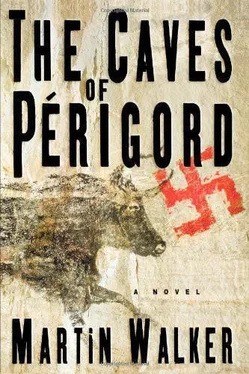Martin Walker - The Caves of Perigord
Здесь есть возможность читать онлайн «Martin Walker - The Caves of Perigord» весь текст электронной книги совершенно бесплатно (целиком полную версию без сокращений). В некоторых случаях можно слушать аудио, скачать через торрент в формате fb2 и присутствует краткое содержание. Жанр: Триллер, на английском языке. Описание произведения, (предисловие) а так же отзывы посетителей доступны на портале библиотеки ЛибКат.
- Название:The Caves of Perigord
- Автор:
- Жанр:
- Год:неизвестен
- ISBN:нет данных
- Рейтинг книги:4 / 5. Голосов: 1
-
Избранное:Добавить в избранное
- Отзывы:
-
Ваша оценка:
- 80
- 1
- 2
- 3
- 4
- 5
The Caves of Perigord: краткое содержание, описание и аннотация
Предлагаем к чтению аннотацию, описание, краткое содержание или предисловие (зависит от того, что написал сам автор книги «The Caves of Perigord»). Если вы не нашли необходимую информацию о книге — напишите в комментариях, мы постараемся отыскать её.
The Caves of Perigord — читать онлайн бесплатно полную книгу (весь текст) целиком
Ниже представлен текст книги, разбитый по страницам. Система сохранения места последней прочитанной страницы, позволяет с удобством читать онлайн бесплатно книгу «The Caves of Perigord», без необходимости каждый раз заново искать на чём Вы остановились. Поставьте закладку, и сможете в любой момент перейти на страницу, на которой закончили чтение.
Интервал:
Закладка:
“Naturally I did, but not from my father,” Manners said easily. The question did not seem to embarrass him in the least. “His reminiscences were all about the Middle East and North Africa, a bit of India. He hardly spoke of France at all. Nor did we visit it much when I was growing up. It was always Austria or Switzerland for the skiing, and summers in Scotland. He took me fishing, taught me to shoot. That kind of thing. Never much of a one for beaches or casinos. The south of France was never his style.”
“Did he never go back to Perigord?”
“Not that I know. But I can’t say I followed his movements closely,” he said. She did not know him well enough even to guess whether this straightforward, rather bluff manner of the plain-speaking officer and gentleman was real, or just a surface skin he wore, like a uniform. She had never known any soldiers. Perhaps they were all this way; what you saw was what you got. But Manners had a quick mind, possibly even a subtle one. She suspected there was more to him than he wanted to display-at least, she cautioned herself, display to her .
“What about Paris?” she asked him. “Catching up with his friend Francois Malrand, the rising political star. Did he keep up with his old comrade-in-arms, de Gaulle’s protege?”
“Maybe he went when I was at school or when he was serving in NATO. I think he was stationed there in some staff job when the HQ was still at Fontainebleau. before de Gaulle kicked them out to Brussels in the 1960s.” He shrugged and fell silent as the waiter came with their smoked salmon. “He went off to the races at Longchamps from time to time, I seem to recall. He won a lot of money once.”
Remember his father, she told herself. There was obviously a lot more to old Colonel Manners than he had ever allowed to meet the eye. Working underground with the French Resistance, staying on the run from the Germans. That must have meant something to do with Intelligence, a skill at keeping secrets. Perhaps his son was the same way, hidden depths.
“Fathers can have a lot of privacy in our kind of family,” he went on. “I was away at school, and he’d retired before I went to Sandhurst. Maybe they sometimes met in London. I wouldn’t know. But that friendship didn’t seem to play a big part in his life. He said nothing when Malrand won the election. I found no letters among his things, and I was as surprised as anyone else when the French ambassador rang to say that the President planned to come to the funeral. I’m slightly surprised you knew. It was kept very quiet.”
“Until the newspapers got hold of it, you mean.”
“Yes, until then.” He ate neatly, she noticed, without paying much attention to the food. Lydia was getting rather tired of foodies; men who made exaggerated talk of sauces and dishes and treated fashionable restaurants as if they were something to do with art.
“Did Malrand come to your house after the funeral?” she asked, making the question casual. She felt uncomfortable, turning the conversation into an interrogation.
“Of course, took a drink, said some gracious things. Stayed about ten minutes. He’d said a few words at the grave, about my father being a great friend of France. That sort of thing. Spoke very good English.”
“Did he look around the house, go to your father’s study? I’m wondering whether he may have seen the rock-I presume it was on display in your father’s room.”
“No, I don’t recall him being anywhere but the hall and the main drawing room. He strolled around the garden with me a bit, saying he remembered it from the war. Apparently he’d been to stay with my father. He spoke about my grandmother and her garden, made me walk him up the drive to the lodge, where she lived when the Americans took over the house.” He put down his knife and fork, finished his champagne.
“But I see what you mean. If my father had picked it up in France, that was the time they were working together in Perigord. He may have known something about it. But if my father was up to no good and pinching bits of France’s glorious heritage, then the President of France would hardly have gone out of his way to honor the memory of someone he suspected as a thief. As for the old man’s study, it was a bit of a mess. Books and maps everywhere. He always had some thought of writing his memoirs. Never did, or at least nothing I ever saw or found beyond some notes. There were maps of the Western Desert all over the place, spread on tables and window ledges. The rock was behind one of them, on a bookcase. But it wasn’t in plain sight, even if Malrand had looked in. He did ask me, though, if my father had ever finished his memoirs. They knew one another well enough for that. The only other sign of his time in France was his copies of Malrand’s books; each signed by the author. I started one of his novels, but couldn’t finish it. Not my kind of thing. But I liked his book about the war in Spain back in the 1930s.
“You seem jolly interested in all this,” he went on, picking at the salad the waiter had brought them. He didn’t seem very pleased with it. But he had not been much interested in the food, simply ordering what she had already chosen. “It must be your American curiosity.”
“Nothing American about it,” she said, suddenly conscious of her accent. “Anyway, my mother’s Scottish.”
“But you are American, or Canadian. And not just by your speech. It’s your manner-you are very direct, very determined, going straight to the point. Look at the way you put me to the question all through lunch. And your interest in the origins of this rock of mine is a lot more than I’d have expected.”
“Why do you say that? That ‘rock of yours’ was entrusted to our care. We lost it. And the police do not seem at all hopeful of getting it back. They said it was a very professional job, by someone who knew what he was looking for and exactly where to find it.”
“That must narrow down the list of suspects,” he said.
“Well, it narrows it down to those people who had seen a copy of the next day’s Times , and the first edition was on sale in London by eleven P.M. on the night of the theft. And then it was on the paper’s Internet site before midnight and on the BBC Radio news at the same time. A million people could have seen or heard it, noticed the reference to the auction house and me. There are some very alert thieves in the art world.”
“But you are not responsible for its loss. It was stolen. There’s a difference,” he protested.
“I still feel responsible, and not only to you. There’s a responsibility to the thing itself, as a piece of history or a work of art. We still don’t know if it’s genuine. We still don’t know its provenance. There may be a marvelous cave out there somewhere. That’s what my German expert says, and he seems pretty keen on tracking it down.”
“What about that French woman from the museum?”
“Clothilde-she was quite ready to pay you an honorarium for the piece. And she has arranged for the museum to offer a reward for its return, which may be the best chance of getting it back. She wanted it, just from seeing the photographs. But she said they are always looking for new caves, some long-term project with an echo sounder or something. It was all a bit technical for me. She seemed pretty confident they’d find it eventually, if it is there to be found. But what do you do now, cash the check and forget it?”
He sat back and looked her squarely in the eye. “Cash the check, certainly. Send you your commission. But then-well, I’m between postings and have some leave. I was in Bosnia for eighteen months, and then I start a staff college course in September. I thought I might spend some of this windfall on a trip to Perigord, look around my father’s old stamping ground. Visit a few of these caves and see what all the fuss is about.”
Читать дальшеИнтервал:
Закладка:
Похожие книги на «The Caves of Perigord»
Представляем Вашему вниманию похожие книги на «The Caves of Perigord» списком для выбора. Мы отобрали схожую по названию и смыслу литературу в надежде предоставить читателям больше вариантов отыскать новые, интересные, ещё непрочитанные произведения.
Обсуждение, отзывы о книге «The Caves of Perigord» и просто собственные мнения читателей. Оставьте ваши комментарии, напишите, что Вы думаете о произведении, его смысле или главных героях. Укажите что конкретно понравилось, а что нет, и почему Вы так считаете.












